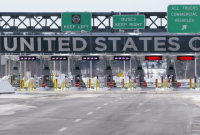Support strong Canadian climate journalism for 2025
After nearly 16 months of rigid travel restrictions, Canada is finally starting to loosen the rules — but only for a specific few.
Eligible air travellers will also be exempt from the requirement that they spend their first three days in Canada in a government-approved hotel.
But the Canada Border Services Agency has a warning: would-be travellers will still be prohibited from entering the country if they were not eligible to travel to Canada before Monday.
Travellers must use the ArriveCAN app or web portal prior to departure to log their vaccination details, as well as the results of a negative COVID-19 test that's less than three days old.
Anyone who arrived before Monday will still be required to spend a full two weeks in quarantine upon arrival, the agency says.
"If you were unable to come to Canada on July 4 of this year, you can't come in on July 5 — there's been no change to all of the restrictions and the provisions that have been issued on that front," said Denis Vinette, CBSA vice-president, travellers branch.
"However, for those that can come to Canada, it's a very cautious, early first step in starting to delay or remove some requirements at the border."
Vinette said the agency is anxious to ensure people understand what is changing, as well as what is not, in order to prevent excessive delays or tie-ups at border control points.
"I think we can expect, certainly in the early days, individuals believing that, you know, July 5 is here, Canada is now open for tourism, recreation and things of that nature. That is not the case," he said.
"We've prepared our front-line staff, who've been having to deal with this since the onset, for those types of scenarios."
The ArriveCAN portal can be accessed either via the Apple or Android app or online via the federal government's website at canada.ca. Travellers are required to use the latest version of the app, which will be updated when the regulations change.
This report by The Canadian Press was first published July 4, 2021.





Comments